Our Programmes
Toddler
Age – 2 to 3 Years
Our Toddler programme nurtures curiosity and early development through interactive play, music, and sensory activities. We provide a safe and stimulating environment where toddlers explore, socialize, and build essential motor and communication skills that are aligned to age level developmental milestones. Below is a glimpse of how our toddlers meet the appropratie developmental milestones.
Cognitive Development
- Exploration & Problem-Solving: Interactive play and sensory activities help toddlers develop curiosity, encouraging problem-solving and early cognitive skills such as object permanence and cause-and-effect understanding.
- Early Language Skills: Music and storytelling enhance vocabulary growth, comprehension, and early communication skills, laying the foundation for expressive and receptive language development.
Social & Emotional Development
- Socialization & Emotional Expression: Group activities and play encourage toddlers to interact, share, and take turns, fostering early social skills and emotional awareness.
- Secure Attachment & Independence: A nurturing environment provides a sense of security, while age-appropriate activities support independence in decision-making and self-help skills.
Motor Skill Development
- Gross Motor Skills: Movement-based activities like dancing, climbing, and jumping strengthen muscles, coordination, and balance.
- Fine Motor Skills: Hands-on sensory activities, such as finger painting, block stacking, and playdough, refine hand-eye coordination and dexterity.
Sensory & Creative Development
- Multi-Sensory Learning: Engaging in tactile experiences (e.g., sand, water, textured materials) enhances sensory processing and cognitive connections.
- Creative Expression: Music, rhythm, and art activities allow toddlers to express themselves, building confidence and imagination.

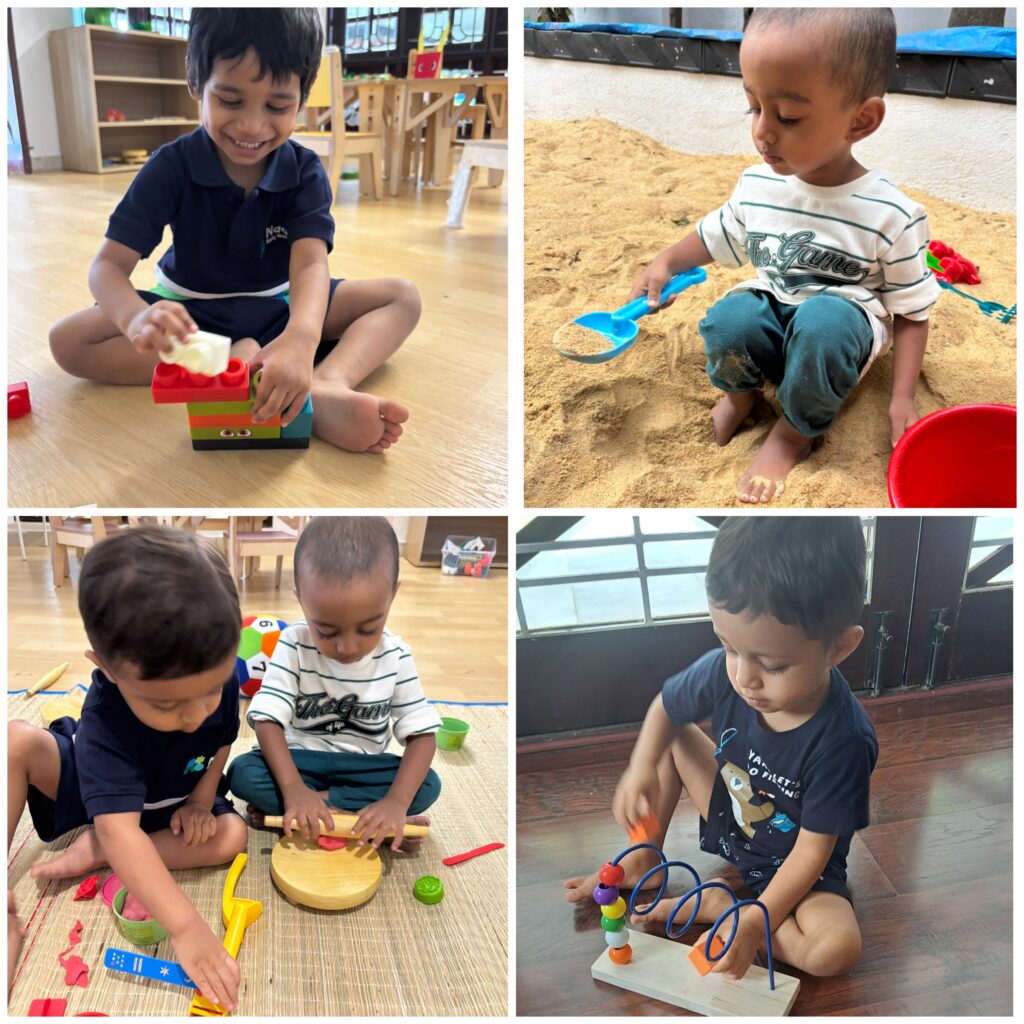


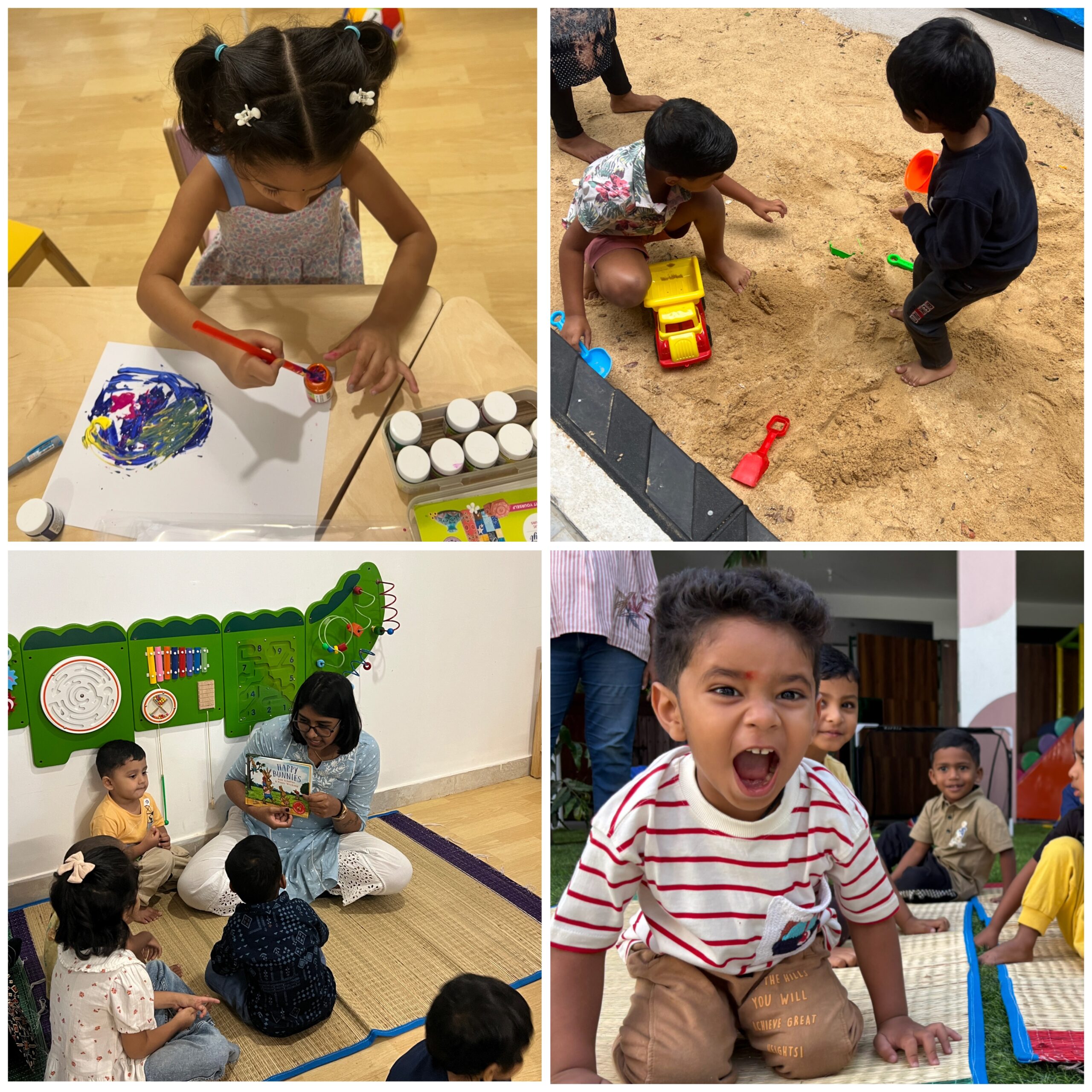

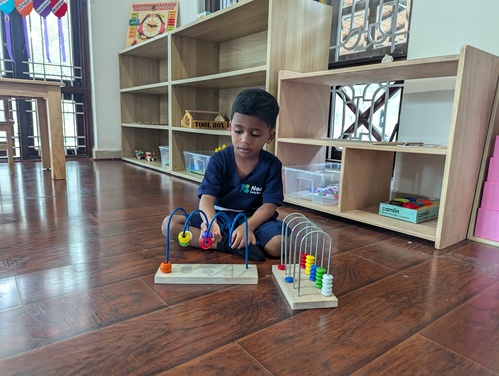

Early Years 1
Age 3 - 4 Years
Our Early Years 1 curriculum designed to support holistic development in young learners. The programme provides a structured yet play-based learning approach, ensuring that children build a strong foundation in literacy, numeracy, social-emotional skills, and problem-solving abilities.
1. Communication, Language, and Literacy
Our students shall develop listening and speaking skills through conversations, songs, and storytelling. Additionally, they shall be able to recognize and respond to familiar words, sounds, and rhymes. At this level they will developing their grip and begin mark-making and early writing skills, such as holding a crayon or tracing letters. Storytelling, role-play to enhance vocabulary and comprehension, phonics-based games to introduce letter recognition to develop early reading skill and drawing and pre-writing exercises to strengthen fine motor control are some of the focus areas to help the child meet the appropriate milestone.
2. Early Mathematics (Numeracy Skills)
Number recognition, identification of basic shapes, patterns, and sizes to develop number sense via developing simple concepts of counting, sorting, and comparing. Students shall explore these concepts via activities such as hands-on counting games with objects, shape-sorting puzzles and pattern-making activities. An interdisciplinary approach is taken through the use of engaging number songs, rhymes and use of connected literature.
3. Personal, Social, and Emotional Development
Developing confidence and self-esteem is vital as it has a life-long impact. We focus on developing confidence in expressing their needs, wants, and feelings. They learn what it means to live in civil society. At this age level the exposure is to learn how to take turns, share, and cooperate with peers. All of this is explored, developed and observed when we share with them simple classroom routines and instructions, group play and role-play scenarios, mood recognition via visual and verbal communication. We ensure all our students are encouraged to complete self-help tasks (e.g., tidying up, dressing, and handwashing) etc.
4. Physical Development
Our infra-structure supports use to expose our students to activities such as obstacle courses, dance, and outdoor play for gross motor development. Additionally, outdoor activities include running, jumping, balancing. Resources and activities using playdough, lacing activities, finger painting, gripping, cutting, threading strengthen fine motor skills and strengthen coordination through movement.
5. Understanding the World
Learning through nature about nature , seasons, and the environment to develop the basic cause-and-effect relationships is vital for us. Additionally, our students learn to respect their own culture and that of others when they study about different cultures and community roles. Our science learning includes simple science experiments (e.g., floating vs. sinking).exploring nature through sensory walks and gardening and themed role-play on topics such as My community and I.
6. Creative Expression
Our students learn how to express ideas and develop their creative expression through art, music, and movement, experiment with colours, textures, and materials and also develop theatre skills by engaging in imaginative and dramatic play.
Overall, our Early Years 1 programme nurtures curiosity, independence, and foundational academic skills, ensuring a smooth transition to further learning stages.
Early Years 2
Age 4 - 5 Years
Early Years 2 continues to build on foundational skills, promoting language development, critical thinking, and early math concepts. Through engaging activities, children enhance their fine and gross motor skills while developing a strong sense of independence. Our curriculum fosters collaboration, creativity, and curiosity, preparing children for more structured learning.
1. Communication, Language, and Literacy
In Early Years 2, children further develop their speaking, listening, and comprehension skills through storytelling, discussions, and phonics-based activities. They begin to recognize and form letters, enhancing their early reading and writing abilities. Structured activities such as role-play and guided reading sessions support vocabulary expansion, sentence formation, and expressive communication. These foundational skills prepare children for confident literacy development in the next stage of learning.
2. Early Mathematics (Numeracy Skills)
Mathematical thinking is encouraged through hands-on exploration of numbers, patterns, and simple problem-solving tasks. Children refine their ability to count, sort, and recognize numerals while being introduced to basic addition and subtraction concepts. Engaging activities, such as number puzzles, shape sorting, and measuring exercises, help them build an understanding of spatial relationships, sequencing, and quantity comparison. These experiences strengthen logical reasoning and a positive attitude toward numeracy.
3. Personal, Social, and Emotional Development
Developing independence, confidence, and emotional intelligence is a key focus in Early Years 2. Children engage in group activities that encourage teamwork, turn-taking, and effective communication with peers. Through role-playing and social storytelling, they learn to express emotions, solve minor conflicts, and understand the importance of kindness and empathy. Daily routines and self-help tasks, such as dressing and organizing materials, reinforce independence and responsibility.
4. Physical Development
Gross and fine motor skills continue to be strengthened through a variety of movement-based and hands-on activities. Outdoor play, dancing, and simple sports help enhance coordination, balance, and overall physical fitness. Fine motor activities, including drawing, threading, and cutting, refine hand-eye coordination and dexterity, preparing children for writing and other precise tasks. These activities promote overall well-being and active engagement in learning.
5. Understanding the World
Curiosity about the world is nurtured through exploration, observation, and hands-on discovery. Children investigate nature, seasons, and basic scientific concepts through sensory play, simple experiments, and outdoor learning. Discussions about different cultures, traditions, and community roles help broaden their understanding of diversity and social responsibilities. By making connections between their experiences and the world around them, children develop critical thinking and inquiry skills.
6. Creative Expression
Imagination and self-expression are encouraged through music, art, dance, and drama. Children explore different materials, colours, and textures to create unique artwork and crafts. Singing, rhythm exercises, and role-playing activities help build confidence and foster a love for creative performance. By engaging in open-ended play and storytelling, children develop their ability to think creatively, express emotions, and communicate ideas in meaningful ways.
Through this balanced and engaging curriculum, Early Years 2 provides a strong foundation for lifelong learning, ensuring children are confident, curious, and well-prepared for more structured academic experiences.
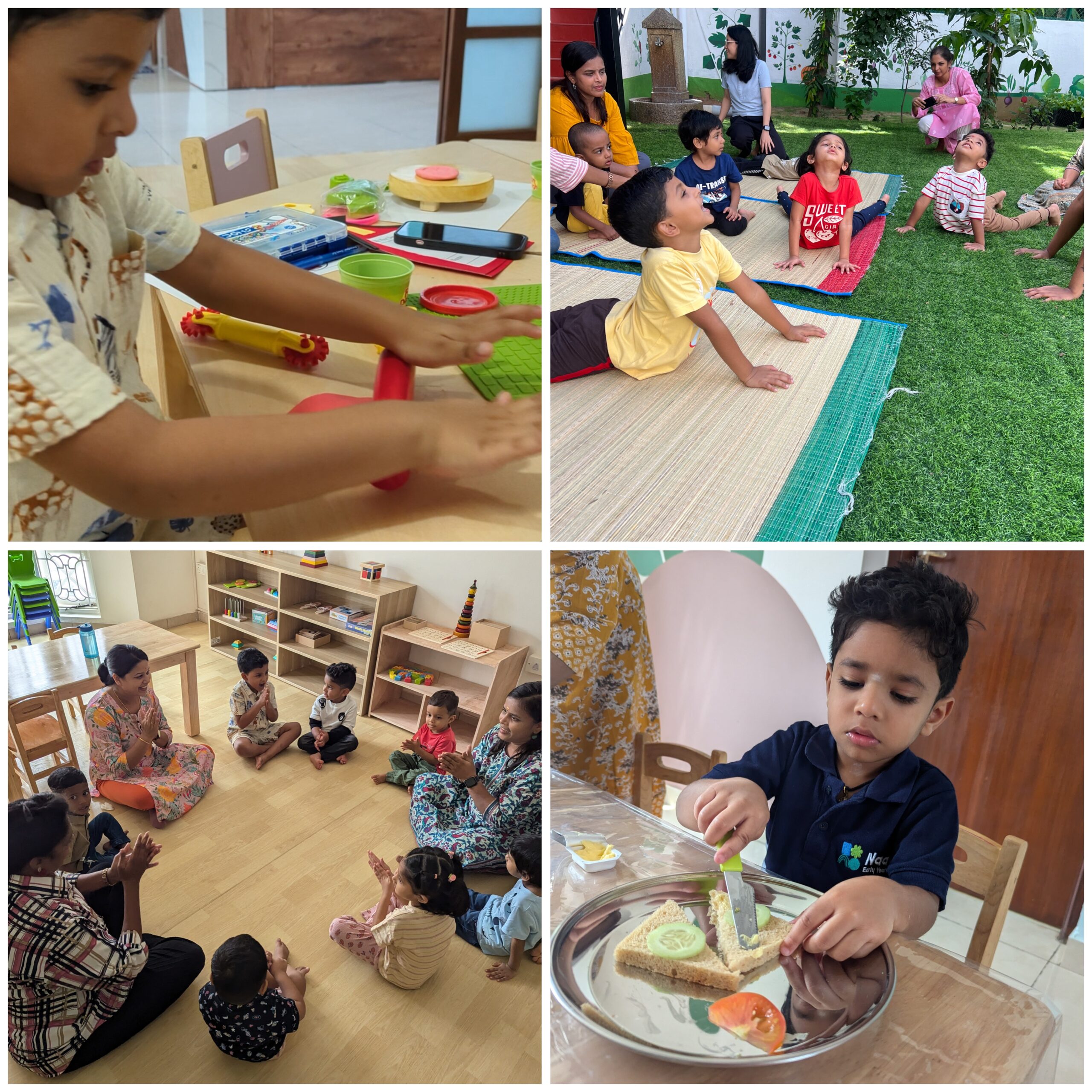

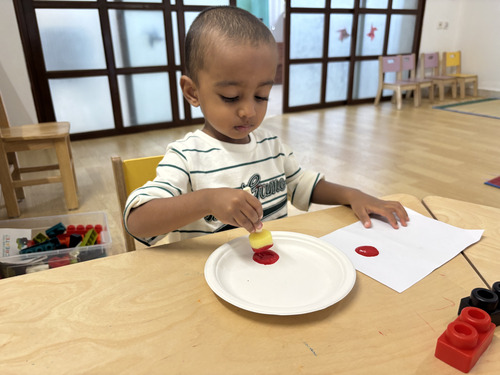
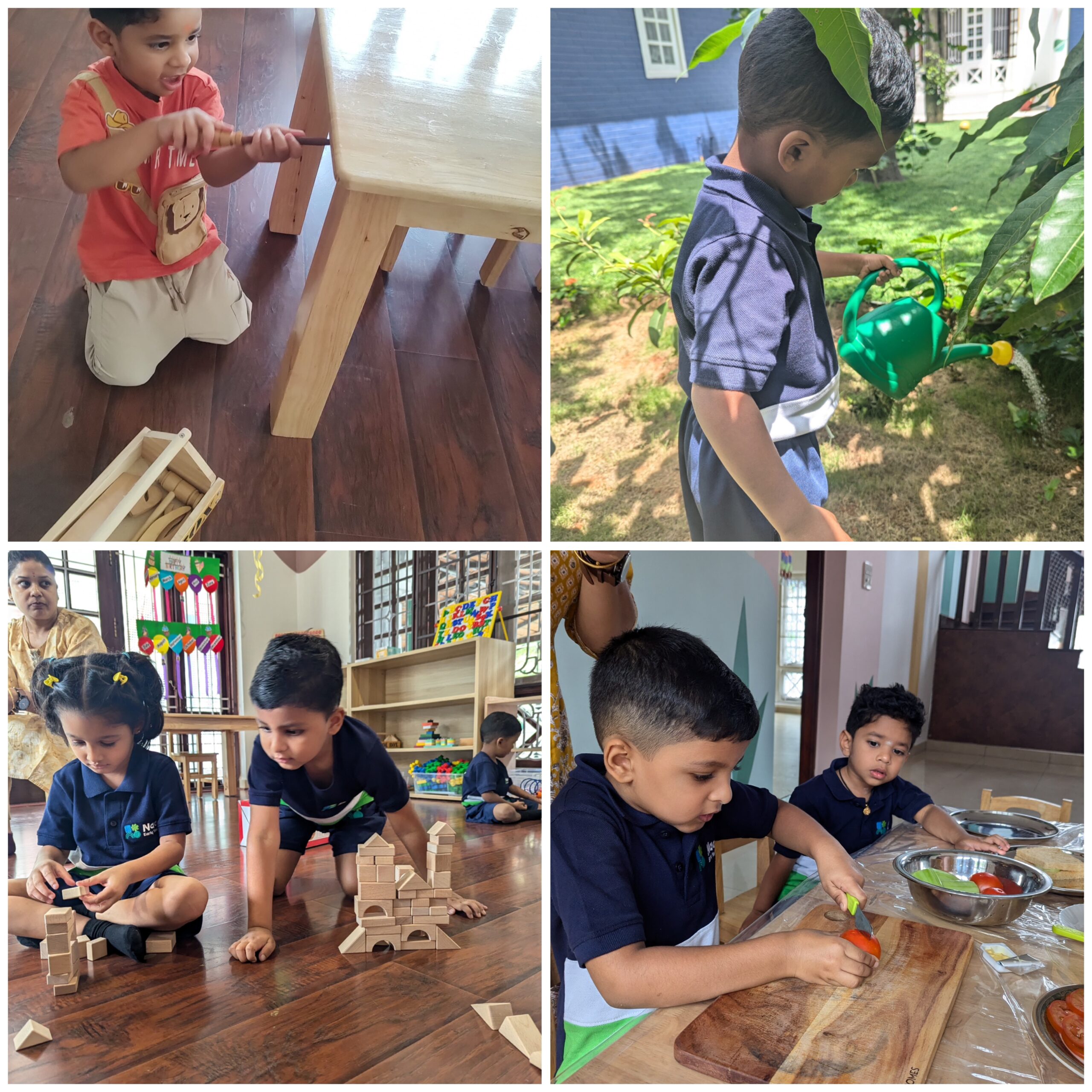


Early Years 3
Age 5 - 6 Years
Early Years 3 prepares children for a smooth transition to primary education by strengthening core academic and social skills. The continuum curriculum, encourages problem-solving, creativity, and communication through interactive and inquiry-based learning. Children develop confidence in reading, writing, and numeracy while continuing to explore their interests through play. Our supportive learning environment helps students become independent, eager learners ready for the next stage of their education across boards.
1. Language and Literacy
Early Years 3 strengthens children’s language and literacy skills through a balanced approach that integrates phonics, storytelling, and guided reading. Children engage in listening and speaking activities that enhance vocabulary, comprehension, and expressive communication. Writing development is supported through letter formation, sentence-building exercises, and creative storytelling, encouraging confidence and fluency. By fostering a love for books and storytelling, the program builds strong foundational literacy skills that prepare children for primary education.
2. Numeracy and Logical Thinking
The numeracy curriculum in Early Years 3 focuses on developing number sense, problem-solving, and logical thinking. Children explore mathematical concepts through hands-on activities, such as counting, sorting, measuring, and pattern recognition. Basic operations like addition and subtraction are introduced in an engaging manner, helping children build confidence in their ability to work with numbers. Through interactive games and real-world applications, students develop a strong mathematical foundation that promotes critical thinking and analytical skills.
3. Science and Environmental Awareness
Early Years 3 introduces children to basic scientific concepts through observation, experimentation, and hands-on exploration. Children learn about the natural world, living things, weather patterns, and simple physical science principles through interactive activities. Sensory play, nature walks, and simple experiments cultivate curiosity and encourage children to ask questions, make predictions, and explore cause-and-effect relationships. This foundational knowledge helps children develop a lifelong interest in scientific inquiry and environmental responsibility.
4. Social and Emotional Development
Building strong social and emotional skills is a key focus of Early Years 3, helping children develop confidence, empathy, and independence. Through group activities, role-playing, and collaborative play, children learn to express their emotions, share, take turns, and work as part of a team. Emotional regulation strategies, such as mindfulness and storytelling, are incorporated to help children manage feelings and build resilience. By fostering positive relationships and a sense of community, the program supports children in developing the social skills necessary for lifelong learning and success.
5. Physical Development and Well-being
Physical development is promoted through structured and unstructured movement activities that enhance gross and fine motor skills. Outdoor play, sports, and physical games help children improve balance, coordination, and strength, while activities like threading, cutting, and drawing refine hand-eye coordination. Health and well-being are also emphasized through lessons on nutrition, hygiene, and self-care. By encouraging active play and healthy habits, Early Years 3 ensures children develop the physical confidence and well-being necessary for a smooth transition to primary school.
6. Creativity and Expressive Arts
Creativity is nurtured through various forms of artistic expression, including drawing, painting, music, drama, and crafts. Children explore different textures, colors, and techniques to develop fine motor skills and artistic confidence. Music and movement activities encourage rhythm, coordination, and self-expression, while dramatic play enhances communication and imagination. By providing opportunities for open-ended creative exploration, the program fosters innovation and self-discovery in young learners.
Overall, by integrating play-based and structured learning, Early Years 3 ensures that children develop holistically, becoming confident, inquisitive learners ready to thrive in any educational setting.
For Enquiry




